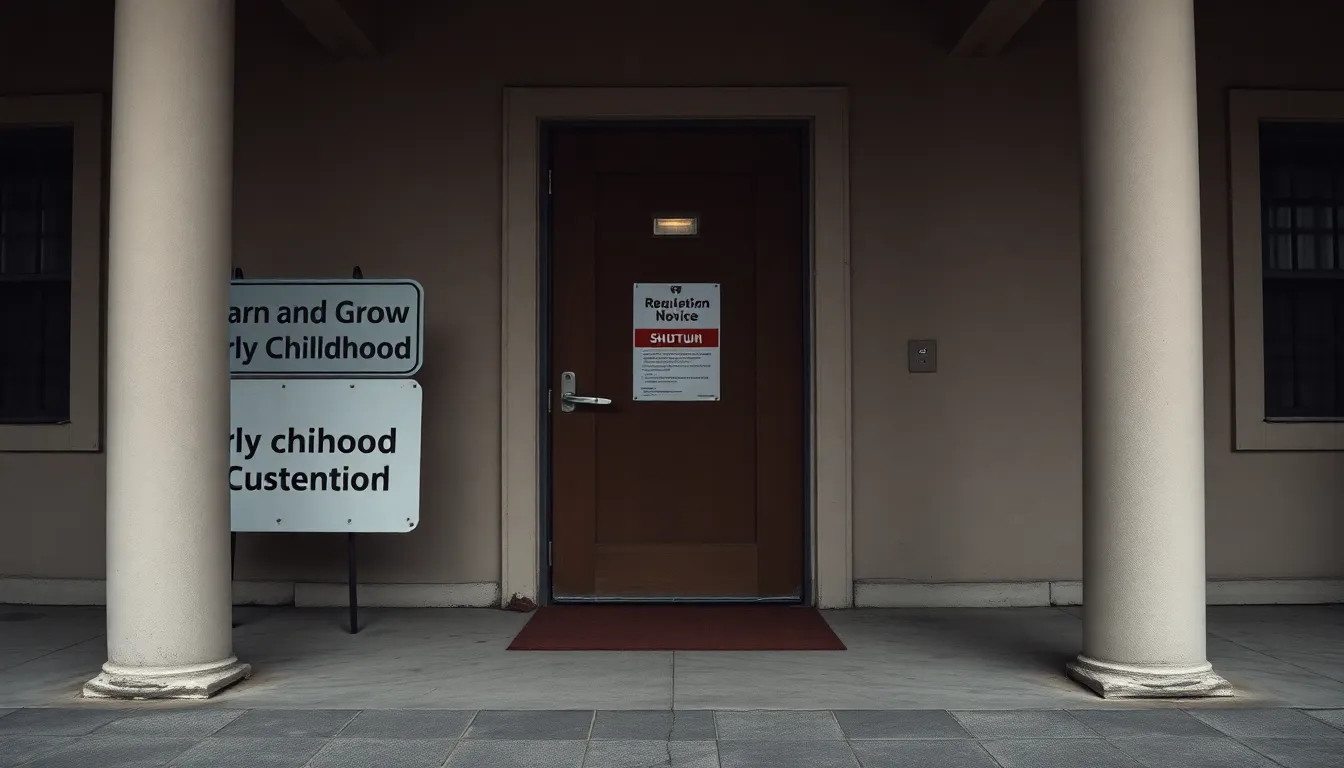A West Scranton day care is at the center of a shocking incident, as a woman charged with assault at local day care faces felony and misdemeanor counts for allegedly abusing a 1-year-old. This troubling case further reveals the facility’s co-owners facing felony charges for failing to report the abuse and the day care’s subsequent shutdown due to systemic safety failures.
Key Implications:
- Caregiver Accountability: A 48-year-old worker faces felony child endangerment and misdemeanor simple assault charges, highlighting severe legal repercussions for direct physical abuse of a vulnerable child in their care.
- Mandatory Reporting Violations: Day care co-owners face felony charges for failing to report the alleged abuse, underscoring the legal and ethical imperative for facility leadership to immediately report suspected child endangerment.
- Systemic Safety Lapses: The day care’s shutdown on October 3 highlights critical operational failures, including inadequate mandated reporter training, manipulation of child-to-employee ratios, and obstruction of state inspections.

48-Year-Old Worker Charged with Felony Endangerment After Assaulting 1-Year-Old
A deeply troubling incident at a West Scranton day care center has resulted in significant charges against an employee. Vanessa Molina-Ramos, a 48-year-old day care worker, now faces a felony count of endangering the welfare of a child and a misdemeanor count of simple assault. These charges stem from an alleged assault on a 1-year-old boy. The incident underscores the critical importance of trust in childcare facilities. Authorities filed the direct charges against the day care worker on Friday, October 10, 2025, following reports of the assault on April 30. This case, involving a woman charged with assault at local day care, serves as a stark reminder of the immense responsibilities held by caregivers.
Specific Allegations and Witness Testimonies
The allegations against Vanessa Molina-Ramos detail severe actions against the young child. Staff member Macy Nicholson reported directly witnessing Molina-Ramos hit the baby three times on the bottom. Nicholson further observed the worker pulling the child’s hair and then tossing him onto the ground. These accounts provide a distressing picture of the alleged abuse inflicted upon a vulnerable infant. Such actions are particularly alarming given the absolute reliance a 1-year-old has on their caregiver for safety and protection within a childcare setting.
Another staff member, Jennifer Purdy, provided corroborating testimony. Purdy stated she distinctly heard a slap, saw the child’s hair being pulled, and subsequently witnessed the young boy on the floor. The consistent accounts from two staff witnesses significantly bolster the charges. These detailed observations by childcare professionals are crucial evidence in cases involving alleged child abuse. During police interviews, Molina-Ramos acknowledged some of the allegations made against her, further advancing the investigation into the specific actions attributed to her during the incident.
Legal Definitions and Implications of the Charges
The legal actions against Molina-Ramos involve serious classifications under the law. A felony count of endangering the welfare of a child is a grave charge, indicating a severe breach of responsibility and trust. This offense occurs when an individual knowingly or recklessly places a child in a situation that risks their physical or mental health. Given the victim’s age, a 1-year-old, the potential for harm is inherently high, often warranting such a severe charge due to the child’s complete vulnerability and inability to self-protect.
The misdemeanor count of simple assault typically applies when someone attempts to cause or intentionally, knowingly, or recklessly causes bodily injury to another. While generally less severe than a felony, it still carries substantial legal consequences, highlighting direct physical harm. The combination of these charges reflects both the direct physical abuse and the broader failure to protect a child entrusted to care. These legal definitions underscore the gravity of the accusations and the commitment of the justice system to hold caregivers accountable for their actions.
Broader Context: Childcare Safety and Community Trust
The prompt reporting by Macy Nicholson and Jennifer Purdy emphasizes the vital role staff members play in ensuring childcare safety. A strong culture of vigilance and immediate reporting is essential in every day care setting. Staff must feel empowered to report suspected abuse or neglect without fear of reprisal, prioritizing the children’s welfare above all else. This incident highlights the profound trust parents place in day care centers, expecting a safe, secure, and nurturing environment for their children.
Incidents like this alleged assault by a woman charged with assault at local day care can deeply erode public confidence in essential childcare services. Such events compel a re-evaluation of caregiver screening, ongoing training, and supervision protocols within these facilities. Parents depend on these centers not only for early education and socialization but, fundamentally, for a secure place where their children are protected. Breaches of this trust require rigorous investigation and appropriate legal responses to safeguard children and reassure communities about the reliability of childcare providers.
Beyond this specific case, broader challenges within the childcare sector deserve attention and proactive solutions. Factors such as how education based on income impacts childcare availability and quality are critical to address systematically. Understanding these systemic issues helps create safer, more equitable environments for all children. Additionally, understanding why we lack key data for informed decisions for childcare policies is vital for shaping effective reforms and ensuring adequate oversight. Initiatives that support the childcare workforce, like Oklahoma schools offering free child care to retain teachers, also contribute to overall stability and quality within the sector.
Ultimately, the tragic details emerging from West Scranton serve as a compelling call to action for reinforcing safety standards across all childcare providers. The collective goal must be to ensure every child is safe, respected, and nurtured within these essential environments. Failing to uphold this standard has significant repercussions, impacting both individual children and the broader community’s faith in critical childcare institutions. Prioritizing child safety through vigilant oversight and stringent accountability remains paramount.

Co-Owners Charged with Felony Failure to Report Abuse After 7-Minute Incident Witnessed
The Learn and Grow Early Childhood Center finds itself embroiled in serious legal trouble following the alleged assault of a 1-year-old child. Specifically, the two co-owners of the facility now face felony charges for failing to report this serious incident to state authorities. This legal action stems from their alleged inaction, even after being fully informed by employees and witnessing disturbing camera footage of the event. The case underscores the critical responsibilities that childcare providers hold for the safety and well-being of the children in their care.
Erin Pallo and Amy Ware, the co-owners of the Learn and Grow Early Childhood Center, are central to these charges. Both women face felony charges of failing to report abuse. The police investigation reveals that Amy Ware herself confirmed witnessing the incident. In a text message to staff, Ware explicitly stated, “she watched it on the cameras and what she witnessed was disgusting.” This direct acknowledgement from a co-owner highlights their immediate awareness of the gravity of the situation involving a woman charged with assault at a local day care.
Further details from Ware’s text message indicated that the worker involved “tormented him for seven minutes.” This specific duration emphasizes the sustained nature of the alleged abuse. Despite this explicit knowledge, police charge that the owners did not fulfill their legal obligations. The co-owners had reportedly assured an employee they would contact the state regarding the incident. However, these assurances were allegedly not followed through, leading directly to the current felony charges against Pallo and Ware. This clear discrepancy between their stated intentions and their alleged actions forms a significant part of the prosecution’s case.
Direct Knowledge and Failure to Act
The direct knowledge and subsequent inaction of the day care’s co-owners regarding the child abuse incident are central to the charges. Both co-owners were informed about the assault by staff members Purdy and Nicholson. This means that multiple avenues of communication ensured they were fully aware of the severity of what occurred. The failure to report, despite these notifications and personal observations, constitutes a profound breach of trust and legal duty.
Ware’s text message, explicitly confirming the “disgusting” nature of what she saw and the “seven minutes” of torment, serves as strong evidence of direct knowledge. Such an admission underscores the critical responsibility of individuals in leadership positions within childcare settings. When incidents arise where a day care worker is charged with assault, prompt and mandated reporting is not merely a procedural step but a fundamental safeguarding principle designed to protect vulnerable children from further harm.
The felony charges of failing to report abuse carry significant legal weight. These charges are not trivial; they reflect a serious legal and ethical lapse. Childcare facilities are mandated reporters, meaning they have a legal obligation to report any suspected child abuse or neglect to the appropriate state authorities. The alleged failure to do so, especially when direct visual evidence and staff reports were available, illustrates a severe disregard for these crucial protections. For more context on the challenges and importance of reliable data in childcare oversight, consider exploring resources on why we lack key data for informed decisions in childcare.
Accountability and Child Safety in Early Childhood Centers
This case highlights the stark contrast between the owners’ assurances to staff about reporting the incident and their alleged failure to do so. This alleged deception not only risks the well-being of the child involved but also undermines the trust that parents place in childcare institutions. The legal system holds such positions to a high standard, understanding that children in day care are entirely dependent on adults for their protection. Failing to report suspected abuse carries severe legal consequences precisely because it compromises child safety.
The incident raises broader questions about oversight and accountability in early childhood education centers. Parents rely on these facilities to be safe havens, and any breach of that trust can have far-reaching emotional and social impacts. The alleged actions of the co-owners in this instance could lead to a loss of public confidence in the Learn and Grow Early Childhood Center, and potentially in other facilities if accountability measures are not seen as robust. Ensuring transparency and strict adherence to reporting protocols are paramount for maintaining safety standards.
The implications for the childcare sector are substantial. Cases like this serve as a powerful reminder of the importance of clear reporting channels and the unwavering commitment required from facility owners to uphold child protection laws. It emphasizes that direct knowledge of abuse necessitates immediate and appropriate action, without exception or delay. Understanding the various factors affecting childcare provision, including quality and access, is critical. Resources discussing education based on income and childcare puzzles often shed light on these systemic challenges.
This specific situation, stemming from an incident where a woman was charged with assault at a local day care, reinforces the vital role of every staff member and owner in safeguarding children. The alleged negligence by the co-owners, despite having explicit knowledge and even visual confirmation, signifies a profound failure in their duty. These charges are intended to reinforce the serious nature of mandatory reporting laws. They aim to ensure that those entrusted with the care of children understand the gravity of their responsibilities and the severe repercussions for deliberately overlooking child abuse. Furthermore, efforts to support and retain high-quality childcare professionals are essential for preventing such incidents. Initiatives like offering free child care to retain teachers can contribute to a more stable and attentive workforce, ultimately benefiting child safety and development.

Learn and Grow Center Shut Down October 3 Due to Training Deficiencies and Ratio Non-Compliance
State officials acted decisively on October 3, shutting down the Learn and Grow Early Childhood Center. This drastic measure followed the discovery of severe systemic failures that jeopardized child safety and regulatory compliance. The investigation revealed profound operational deficiencies, including inadequate staff training for mandated reporting, explicit directives against speaking during state inspections, and consistent non-compliance with crucial child-to-employee ratios. These combined issues painted a clear picture of an environment where children were not adequately protected, and accountability was significantly undermined. The closure underscores the critical importance of stringent adherence to childcare regulations to safeguard vulnerable children.
Critical Gaps in Mandated Reporter Training
A cornerstone of child protection in any childcare setting is the proper training of mandated reporters. These individuals, typically staff members, are legally obligated to report any suspected child abuse or neglect to state authorities. At the Learn and Grow Early Childhood Center, this fundamental safeguard was severely compromised. Day care staff members confirmed they were not adequately trained to make reports to ChildLine, a critical state reporting mechanism. Specifically, at least two staff members, identified as Purdy and Nicholson, attested to this alarming lack of essential training.
This deficiency creates a significant risk. Even if staff recognized signs of abuse, their inability to properly report it could leave children in harm’s way. The discrepancy between staff being designated as mandated reporters and the complete absence of training on how to fulfill this responsibility is a grave concern. Such an oversight demonstrates a critical failure by the center’s administration to uphold its legal and ethical duties. It highlights how a lack of proper procedures can prevent timely intervention, potentially allowing incidents to escalate before they are addressed. Without this vital training, a situation could arise where a woman charged with assault at local day care might have her actions go unreported, prolonging harm to children. This systemic failure can have severe consequences for the children entrusted to the center’s care.
Manipulation of Child-to-Employee Ratios
Ensuring appropriate child-to-employee ratios is another non-negotiable aspect of quality childcare. These ratios are established to guarantee that every child receives adequate supervision and care, minimizing risks and promoting a safe learning environment. However, state officials found that Learn and Grow Early Childhood Center routinely manipulated its staffing to appear compliant. Administrators would frequently pull staff from one room to another, creating the illusion of meeting mandated guidelines in specific areas. This practice, while temporarily satisfying inspection requirements in one room, left other rooms out of regulation, endangering children elsewhere in the facility.
This consistent non-compliance with state ratio requirements indicates a deliberate pattern of deceptive practices. Such manipulation not only violates regulations but also places children at increased risk of accidents, injuries, or neglect due to insufficient supervision. The constant shuffling of staff can also disrupt children’s routines and relationships with caregivers, affecting their emotional well-being. Ensuring proper staffing levels is paramount for both safety and quality of care, a principle the Learn and Grow Center evidently disregarded. This highlights why strict adherence to these guidelines is not merely bureaucratic but absolutely essential for daily operations. For more on ensuring informed decisions in childcare, understanding the need for key data is crucial.
Obstruction and Lack of Transparency During State Inspections
Adding to its list of systemic failures, the Learn and Grow Early Childhood Center actively obstructed state oversight. Staff members confirmed they were explicitly “instructed not to speak during state inspections.” This directive is a serious impediment to transparency and accountability. State inspections are designed to provide an objective assessment of a facility’s compliance with safety and operational standards. By silencing staff, administrators prevented inspectors from gathering accurate information directly from those on the front lines of child care.
This practice undermines the entire regulatory process, allowing systemic issues to remain hidden and unaddressed. It demonstrates a clear intent to conceal problems rather than to resolve them. Such actions erode trust between the facility and regulatory bodies, ultimately compromising child safety. The ability of inspectors to engage freely with all staff members is critical for a thorough evaluation, as staff often possess direct knowledge of day-to-day conditions. This intentional lack of transparency is a red flag for any institution entrusted with the care of children.
The Cumulative Impact of Systemic Failures on Child Protection
The operational and training deficiencies at the Learn and Grow Early Childhood Center created a hazardous environment for children. The combination of untrained mandated reporters, manipulated staffing ratios, and directives to silence staff during inspections formed a dangerous trifecta of systemic failure. These issues collectively contributed to the center’s profound failure to protect children and adequately report suspected abuse. The actions of the administration demonstrated a clear disregard for both child safety protocols and state regulations.
State officials made the decision to shut down the center on October 3, a necessary intervention to protect children from further harm. This incident serves as a stark reminder of the importance of robust regulatory oversight and the critical need for childcare facilities to prioritize child safety above all else. When facilities fail to provide adequate training, manipulate staffing, and obstruct inspections, the well-being of every child is at stake. It underscores the potential for severe consequences when regulatory compliance is neglected, illustrating why swift and decisive action is imperative in such circumstances. The fact that a woman charged with assault at local day care could potentially go unreported due to these systemic issues emphasizes the urgency of these regulations. Parents seeking care must ensure their chosen providers adhere strictly to all guidelines.
Featured image generated using Flux AI
The Times-Tribune: “Worker charged with assault of 1-year-old at West Side day care”

Pingback: Rochester Child Care Center Tour: 50 Years, Urgent Repairs & Infant Care - Child Care